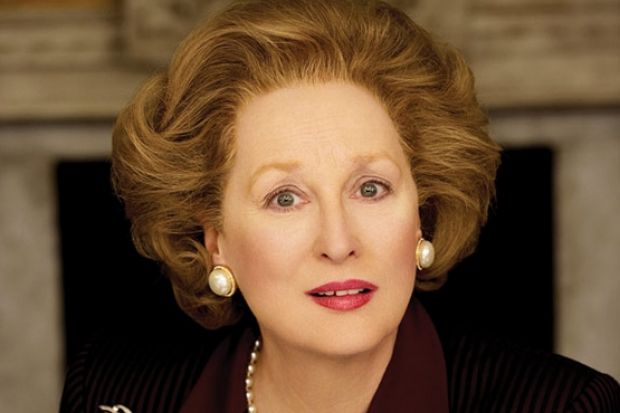The Iron Lady
Directed by Phyllida Lloyd
Starring Meryl Streep, Jim Broadbent and Olivia Colman
Released in the UK on 6 January
I shall never forget the sickening crash of plate glass on Charing Cross Road. It was the first time I had seen looters. Nor can I forget the sound of mounted policemen galloping towards Cambridge Circus - and me. The Poll Tax riots will always be symbolic of everything that went wrong in Thatcher's Britain. A huge cross-section of the population participated in those demonstrations, but Thatcher's policies could work only by disregarding their needs. The Iron Lady glances at this, mainly through newsreel, but has nothing to say about it, just as it notes without comment other salient events of the Thatcher era, including the miners' strike.
Instead, this film takes a retrospective view of the career of the superannuated former premier (played by Meryl Streep), its argument being that her rise through the ranks of a patriarchal, upper-middle-class Conservative Party was a triumph for womankind, and that Thatcher, the erstwhile darling of Lord McAlpine and Lord Hanson, is a hitherto-neglected feminist icon. It makes this point by portraying almost every man with whom she had dealings during the course of her career as manipulative, duplicitous, fawning, or in some way dismissive of her - whether it be the Tory grandees who laugh at her for being "a grocer's daughter", or Michael Heseltine (played by Richard E. Grant), who is made to seem supercilious, scheming and underhand. The exception is Airey Neave, played by the excellent Nicholas Farrell, but the film has no idea why Neave - a Tory MP of the old school - should have wanted to open doors for Thatcher; it merely suggests that he did so.
If the film's writer and director (Abi Morgan and Phyllida Lloyd, respectively) have no clue as to the motivation of most of their characters, they have no doubt of that of their protagonist. Thatcher wanted "to get things done", as she is made to say, time and again. But what did that mean? In her case, it meant that she wanted to dismantle the welfare state - but when it comes to the Conservative thinktanks that formulated that agenda, or Friedmanite economics, or such bruisers as that former airline pilot turned Machiavel, Norman Tebbit, this film is silent. They have no place in its blinkered vision of the past.
All the same, this film will have us suppose her a feminist icon, and the men with whom she came into contact - including her husband (played by Jim Broadbent), who is shown to have advised her to step down - as bigoted fools. This would matter less were it not that serious feminist arguments are to be made about the Thatcher era, all of which are disregarded by the film's makers. There is nothing here about the Greenham Common women, for instance, or Thatcher's relations with the only woman she promoted to her Cabinet, Baroness Young. Nor does it have any explanation for the paradox that, given how prejudiced it would have us believe men to be, Thatcher was first made Conservative candidate for Finchley, and then made Conservative leader, by electorates consisting almost entirely of men.
At its heart, the film boasts a remarkable incarnation of Thatcher by Streep. Like all her performances, it is studied, coached, mechanical, although (unusually for her) not completely without passion. The film is constructed in such a way that none of the distinguished actors who here take supporting roles is allowed much space other than Olivia Colman, who plays Carol Thatcher. But I wouldn't advise anyone to see this film solely for the pleasure of seeing Ms Streep; this is an irritatingly blinkered vision of the past - not merely because it is viewed through the mind of someone suffering from senile dementia, but because it is as doctrinaire in its views as Thatcher was in her heyday. Like Thatcher, it refuses to admit any alternative. "Weak men!" she is made to say, prior to her resignation. But her downfall was not due to weak men; there were other factors, none of which fit this film's agenda.
The Iron Lady has already been labelled controversial, so will probably make money for the Weinstein Company, which produced it. American audiences will see it, not just for Streep, but because they regard Thatcher as the strongest British leader of post-war times, albeit one whose policies left them largely untouched. Those who did bear witness to what she did at first hand are likely to object to this film's sentimental attitude towards its subject and the way it trivialises the 1980s. Even the most ardent of Thatcher idolaters will find The Iron Lady worthless as history or political commentary, because it disregards so much. I question even whether it has much value as feminist propaganda, other than in the most superficial way - on the same level as the Spice Girls' "girlpower" slogan. Real insight into the Thatcher years is afforded by such plays as David Hare's The Absence of War or Alan Ayckbourn's A Small Family Business, which deal with issues undreamed of by the makers of The Iron Lady.
Register to continue
Why register?
- Registration is free and only takes a moment
- Once registered, you can read 3 articles a month
- Sign up for our newsletter
Subscribe
Or subscribe for unlimited access to:
- Unlimited access to news, views, insights & reviews
- Digital editions
- Digital access to THE’s university and college rankings analysis
Already registered or a current subscriber? Login
